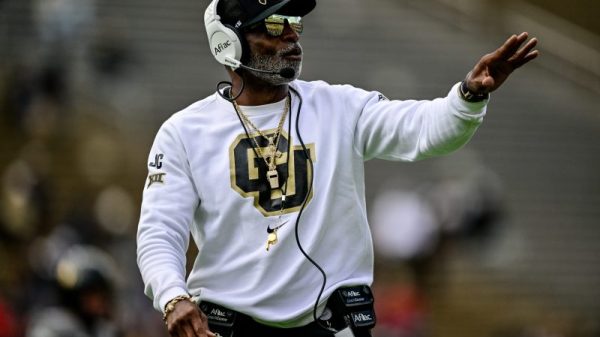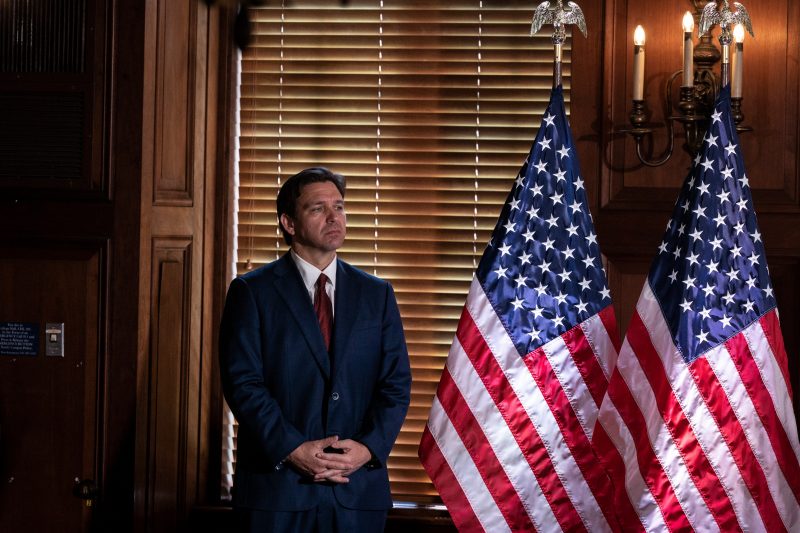Florida Gov. Ron DeSantis said Thursday that, if elected president, he would consider pardoning some of those convicted on charges related to the deadly Jan. 6, 2021, insurrection at the U.S. Capitol.
Hosts of the conservative “The Clay Travis & Buck Sexton Show” asked DeSantis if he thinks Jan. 6 defendants “deserve to have their cases examined by a Republican president,” and whether he would pardon former president Donald Trump if he were “charged with federal offenses.” DeSantis said that on his first day in office, he would “have folks that will get together and look at all these cases.”
“Now, some of these case, some people may have a technical violation of the law,” DeSantis said. “But if there are three other people who did the same thing but just in a context, like [the Black Lives Matter protests in 2020] and they don’t get prosecuted at all, that is uneven application of justice, and so … we will use the pardon power.”
Twice in the interview, DeSantis avoided directly answering questions on whether he’d pardon Trump but left open the possibility.
“I would say any example of this favored treatment based on politics, or weaponization, would be included in that review, no matter how small or how big,” the GOP presidential candidate said.
DeSantis said he would use his pardon powers “at the front end” of his administration, noting that “a lot of people wait until the end of the administration to issue pardons.” Trump issued pardons throughout his presidency, including a flurry as he was leaving office to many of his allies.
The storming of the Capitol by a pro-Trump mob intent on stopping the certification of Joe Biden’s electoral college win and the democratic transfer of power resulted in five dead, injuries to 140 members of law enforcement and the ransacking of parts of the Capitol.
According to the Justice Department, more than 1,000 individuals have been arrested in connection with the Jan. 6 attack. Out of those, more than 300 have been charged with obstructing or impeding an official proceeding, and nearly 350 defendants have been charged with assaulting officers. The average sentence for an obstruction of an official proceeding charge for Jan. 6 defendants has been about 42 months, Post data shows.
DeSantis’s comments are similar to those of Trump, though the former president has said he would not only issue pardons but make an apology to the Jan. 6 offenders. At a CNN town hall earlier this month, Trump said, “I am inclined to pardon many of them. I can’t say for every single one, because a couple of them, probably they got out of control.”
He added that “most likely” he would pardon “a large portion of them,” adding, “and it’ll be very early on.”
Trump also has lent his voice to a recording of the “J6 Prison Choir” and played it to start the first rally of his 2024 presidential campaign. The song, “Justice for All,” features Trump reciting the Pledge of Allegiance mixed with a rendition of the national anthem.
In the interview on Thursday, DeSantis, who served three terms in Congress, emphasized that he would issue pardons on a “case-by-case basis.”
“We’re going to find examples where that government has been weaponized against disfavored groups, and we will apply relief as appropriate,” DeSantis said.
DeSantis’s comments came the same day Oath Keepers founder Stewart Rhodes was sentenced to 18 years in prison for seditious conspiracy in connection to his actions on Jan. 6. U.S. prosecutors argued that Rhodes played a significant role in spreading doubt about the 2020 presidential election and led more than 20 other Americans to seek to use violence against the government to thwart the transfer of power from Trump to Biden.
During his sentencing, as NBC News reported, Rhodes said he considers himself and every other Jan. 6 defendant a “political prisoner, because all of them are being grossly overcharged.”
“I hope Trump wins in 2024,” Rhodes added.
In handing down the sentence, Judge Amit Mehta said, “You, sir, present an ongoing threat and a peril to this country and to the republic and to the very fabric of this democracy.”



























